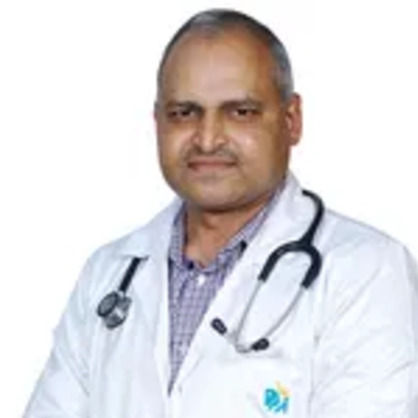Hyperthermia: Symptoms, Causes, and Treatment Options
Discover the symptoms, causes, and treatment options for hyperthermia. Learn how to prevent and manage dangerously high body temperatures effectively.

Written by Dr. Dhankecha Mayank Dineshbhai
Reviewed by Dr. M L Ezhilarasan MBBS
Last updated on 14th Aug, 2025

Hyperthermia is a condition where your body temperature rises significantly above the normal range (98.6°F or 37°C) due to excessive heat exposure or an inability to cool down. Unlike a fever, which is caused by an infection, hyperthermia occurs when your body absorbs or produces more heat than it can release.
This condition can range from mild (heat cramps) to severe (heatstroke), and if left untreated, it can lead to serious health complications. Understanding the symptoms, causes, and treatment options can help you stay safe, especially during hot weather or intense physical activity.
Symptoms of Hyperthermia
Hyperthermia symptoms vary depending on its severity. Recognizing early signs can help prevent serious complications:
Mild to Moderate Symptoms
- Heavy sweating
- Fatigue or weakness
- Dizziness or lightheadedness
- Muscle cramps (heat cramps)
- Nausea or vomiting
- Headache
- Fast, weak pulse
Severe Symptoms (Heatstroke – A Medical Emergency!)
- Body temperature above 104°F (40°C)
- Hot, dry skin (no sweating)
- Confusion or agitation
- Rapid, strong pulse
- Loss of consciousness
- Seizures
If you or someone around you experiences severe symptoms, seek emergency medical help immediately, as heatstroke can be life-threatening.
Consult a Top Specialist
Causes of Hyperthermia
Hyperthermia occurs when your body fails to regulate its temperature. Common causes include:
1. High Environmental Temperature – Prolonged exposure to hot weather, especially with high humidity, makes it harder for sweat to evaporate and cool the body.
2. Strenuous Physical Activity – Exercising in hot conditions without proper hydration can lead to overheating.
3. Dehydration – Not drinking enough fluids reduces sweating, making it difficult for the body to cool down.
4. Certain Medications – Some drugs (e.g., diuretics, antihistamines, antidepressants) can interfere with temperature regulation.
5. Medical Conditions – Obesity, heart disease, and poor circulation increase the risk of hyperthermia.
6. Alcohol Consumption – Alcohol impairs the body’s ability to regulate temperature.
7. Wearing Heavy Clothing – Tight or excessive clothing traps heat, raising body temperature.
How Hyperthermia Affects Your Health
When your body overheats, it struggles to maintain normal functions. Mild cases (heat exhaustion) cause discomfort, but severe hyperthermia (heatstroke) can damage vital organs like the brain, heart, and kidneys. Without prompt treatment, it can lead to:
- Organ failure
- Brain damage
- Coma or death
Treatment Options for Hyperthermia
Below are a few treatment options for hyperthermia,
Immediate First Aid
If someone shows signs of hyperthermia:
1. Move to a Cooler Place – Get out of the sun and into shade or an air-conditioned room.
2. Hydrate – Drink cool water or electrolyte-rich fluids (avoid alcohol or caffeine).
3. Cool the Body –
- Apply cool, wet cloth to the skin.
- Take a cool shower or bath.
- Use fans to promote evaporation.
4. Loosen Clothing – Remove excess or tight clothing to help release heat.
5. Monitor Symptoms – If symptoms worsen (e.g., confusion, unconsciousness), seek emergency help.
Medical Treatment
For severe cases (heatstroke), doctors may provide:
- IV Fluids – To treat dehydration.
- Cooling Blankets or Ice Packs – To rapidly lower body temperature.
- Medications – To prevent complications like seizures.
Preventing Hyperthermia
Prevention is the best way to avoid hyperthermia. Follow these tips:
- Stay Hydrated – Drink plenty of water, especially when outdoors.
- Avoid Peak Sun Hours – Limit outdoor activities between 10 AM and 4 PM.
- Wear Light Clothing – Choose loose, light-colored, breathable fabrics.
- Take Breaks in the Shade – Rest frequently if working or exercising in heat.
- Never Leave Anyone in a Parked Car – Temperatures inside a car can rise dangerously within minutes.
- Check Medications – Consult your doctor if your meds increase heat sensitivity.
When to See a Doctor
If you experience:
- Persistent dizziness or nausea
- No improvement with self-care
- Signs of heatstroke (confusion, high fever, unconsciousness)
Seek medical help immediately.
Need Expert Advice?
If you're concerned about hyperthermia or heat-related illnesses, consult a doctor. You can book an appointment with Apollo 24|7 for expert guidance and personalized care.
Final Thoughts
Hyperthermia is a serious but preventable condition. By staying aware of the symptoms, taking precautions, and acting quickly if overheating occurs, you can protect yourself and your loved ones. Stay cool, stay hydrated, and prioritize your health—especially during hot weather!
Consult a Top Specialist
Consult a Top Specialist

Dr D M Karthik
General Practitioner
4 Years • MBBS, Fellowship in Diabetes Mellitus, Advance certificate in Diabetes Mellitus, Derma Nutrition Certification
Visakhapatnam
Apollo 24|7 Clinic - Andhra Pradesh, Visakhapatnam

Dr. M L Ezhilarasan
General Practitioner
6 Years • MBBS
Visakhapatnam
Apollo 24|7 Clinic - Andhra Pradesh, Visakhapatnam

Dr. Swagata Sircar
General Physician/ Internal Medicine Specialist
8 Years • MBBS, MD General Medicine
Kolkata
HealthYou Speciality Clinic & Diagnostics., Kolkata
(50+ Patients)

Dr. Dhanraj K
General Physician/ Internal Medicine Specialist
25 Years • MBBS, MD Internal Medicine - Osmania Medical College, Hyderabad
Hyderabad
Apollo Hospitals Jubilee Hills, Hyderabad
(375+ Patients)

Dr. Gunashree V L
General Physician/ Internal Medicine Specialist
3 Years • MBBS
Bengaluru
Apollo Clinic, JP nagar, Bengaluru
Consult a Top Specialist

Dr D M Karthik
General Practitioner
4 Years • MBBS, Fellowship in Diabetes Mellitus, Advance certificate in Diabetes Mellitus, Derma Nutrition Certification
Visakhapatnam
Apollo 24|7 Clinic - Andhra Pradesh, Visakhapatnam

Dr. M L Ezhilarasan
General Practitioner
6 Years • MBBS
Visakhapatnam
Apollo 24|7 Clinic - Andhra Pradesh, Visakhapatnam

Dr. Swagata Sircar
General Physician/ Internal Medicine Specialist
8 Years • MBBS, MD General Medicine
Kolkata
HealthYou Speciality Clinic & Diagnostics., Kolkata
(50+ Patients)

Dr. Dhanraj K
General Physician/ Internal Medicine Specialist
25 Years • MBBS, MD Internal Medicine - Osmania Medical College, Hyderabad
Hyderabad
Apollo Hospitals Jubilee Hills, Hyderabad
(375+ Patients)

Dr. Gunashree V L
General Physician/ Internal Medicine Specialist
3 Years • MBBS
Bengaluru
Apollo Clinic, JP nagar, Bengaluru
